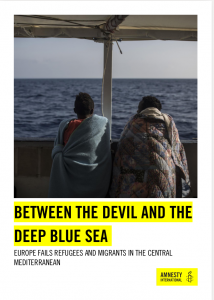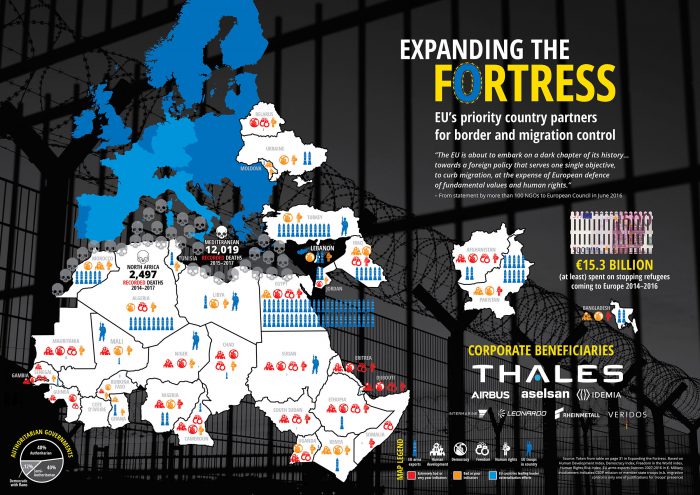Today Amnesty International has published the briefing Between the devil and the deep blue sea: Europe fails refugees and migrants in the Central Mediterranean, which documents how the number of people drowning in the Central Mediterranean or being taken back to squalid detention centres in Libya has surged as a result of European policies aimed at closing the central Mediterranean route. It highlights how Italian policies have left people stranded at sea for days and analyses how European Union (EU) countries are conspiring to contain refugees and migrants in Libya, where they are exposed to torture and abuse.
Süddeutsche Zeitung | 24.07.2018
- Die Zahl der Flüchtlinge auf der zentralen Mittelmeerroute ist stark gesunken.
- In Italien sind mehr als 80 Prozent weniger Bootsflüchtlinge als vergangenes Jahr angekommen.
- An anderen Punkten Europas steigen die Zahlen dafür sprunghaft – wenn auch auf relativ niedrigem Niveau.
Von Andrea Bachstein
Flexibilität scheint eine der größten Fähigkeiten krimineller Menschenschmuggler zu sein. Wo immer eine Passage eng wird, eine Grenze sich schließt, finden sie im Handumdrehen neue Wege für das Geschäft mit Flüchtlingen und Migranten, das die UN weltweit auf etwa sieben Milliarden Dollar schätzen.
Die Hälfte davon wird auf den Mittelmeerrouten kassiert. Auch dort lässt sich leicht nachvollziehen, dass die Schleuser rasch auf neue Lagen reagieren: Die Zahl der Flüchtlinge und Migranten ist in diesem Jahr drastisch gesunken, wie Daten der europäischen Grenzschutzagentur Frontex und der UN-Organisation für Migration IOM belegen. Frontex stellt einen Gesamtrückgang um fast die Hälfte fest, in Italien sind es sogar mehr als 80 Prozent weniger Bootsflüchtlinge als vergangenes Jahr. An anderen Punkten Europas steigen die Zahlen dafür sprunghaft – wenn auch auf relativ niedrigem Niveau.
Presseerklärung PRO ASYL vom 28.06.1018
PRO ASYL warnt noch einmal mit Nachdruck, die libysche Küstenwache weiter aufzurüsten und ihr die Rettung Schiffbrüchiger zu übertragen. PRO ASYL betrachtet den beabsichtigten Ausbau der Kooperation als Verrat an Europas Werten. Weil die Bundeskanzlerin zur Betriebenen der CSU geworden ist, reiht sie sich in die Allianz der Grenzschließer ein. Nach der gestrigen Presseerklärung von Ratspräsident Donald Tusk soll die libysche Küstenwache weiter ausgerüstet werden. Menschen, die vor Folter, Krieg, Terror und Verfolgung fliehen, sollen vor Europas Grenzen abgefangen werden.
»Statt Europas Werte zu verteidigen, scheint für die Grenzschließung jedes Mittel recht. Die oft dramatischen Fluchtgründe und die Menschenrechte Schutzbedürftiger spielen bei den Überlegungen der Staatschefs keine Rolle«, sagt Günter Burkhardt, Geschäftsführer von PRO ASYL.
Weiterlesen »
Spiegel Online | 01.06.2018
„Wir müssen besser werden“
Die Rede ist von einer neuen „Balkan-Küstenroute“: 2018 kamen wieder viel mehr Flüchtlinge von der Türkei nach Griechenland. Frontex-Chef Fabrice Leggeri zeigt sich besorgt – und offen für Afrika-Einsätze.
Ein Interview von Giorgos Christides
SPIEGEL ONLINE: Herr Leggeri, zuletzt stand die Route von Libyen nach Italien im Fokus. Doch in den ersten drei Monaten dieses Jahres ist die Zahl der Flüchtlinge, die aus der Türkei nach Griechenland kommen, im Vergleich zu den drei Monaten davor um 92 Prozent gestiegen. Warum?
Fabrice Leggeri: In der Tat ist der östliche Mittelmeerraum wieder die wichtigste Flüchtlingsroute in die EU. Das sind die Folgen der Situation im Nahen Osten und in Syrien. Immer mehr Menschen suchen Schutz und fliehen in die Türkei. Ihr Ziel ist der Westen.
tni | 11.05.2018
The policies, the profiteers and the people shaped by EU’s border externalisation programme
The EU has made migration control a central goal of its foreign relations, rapidly expanding border externalisation measures that require neighbouring countries to act as Europe’s border guards. This report examines 35 countries, prioritised by the EU, and finds authoritarian regimes emboldened to repress civil society, vulnerable refugees forced to turn to more dangerous and deadly routes, and European arms and security firms booming off the surge in funding for border security systems and technologies.
Executive Summary
The plight of the world’s 66 million forcibly displaced persons seems to only trouble the European Union’s conscience when the media spotlight turns on a tragedy at Europe’s borders. Only one European nation – Germany – is even in the top ten countries worldwide that receive refugees leaving the vast majority of forcibly displaced persons hosted by some of the world’s poorest nations. The invisibility therefore is only broken when border communities such as Calais, Lampedusa, Lesvos become featured in the news as desperate people fleeing violence end up dead, detained or trapped.
These tragedies aren’t just unfortunate results of war or conflict elsewhere, they are also the direct result of Europe’s policies on migration since the Schengen agreement in 1985. This approach has focused on fortifying borders, developing ever more sophisticated surveillance and tracking of people, and increasing deportations while providing ever fewer legal options for residency despite ever greater need. This has led many forcibly displaced persons unable to enter Europe legally and forced into ever more dangerous routes to escape violence and conflict. Weiterlesen »
New York Times | 22.04.18
By Patrick Kingsley
ABU JAMAL, Sudan — At Sudan’s eastern border, Lt. Samih Omar led two patrol cars slowly over the rutted desert, past a cow’s carcass, before halting on the unmarked 2,000-mile route that thousands of East Africans follow each year in trying to reach the Mediterranean, and then onward to Europe.
His patrols along this border with Eritrea are helping Sudan crack down on one of the busiest passages on the European migration trail. Yet Lieutenant Omar is no simple border agent. He works for Sudan’s feared secret police, whose leaders are accused of war crimes — and, more recently, whose officers have been accused of torturing migrants.
Indirectly, he is also working for the interests of the European Union. “Sometimes,” Lieutenant Omar said, “I feel this is Europe’s southern border.”
Weiterlesen »
Deutschlandfunk | 01.04.2018
Bei der Überfahrt von Marokko nach Spanien sind mehrere Flüchtlinge ertrunken.
Wie die spanischen Rettungskräfte mitteilten, wurden vier Leichen aus dem Meer vor Gibraltar geborgen. Ein Flüchtling konnte gerettet werden. Nach seinen Angaben befanden sich insgesamt zwölf Menschen auf dem Boot, mit dem sie über die Meer-Enge die spanische Küste erreichen wollten.
Nach Angaben der Internationalen Organisation für Migration sind in diesem Jahr bereits 120 Menschen bei dem Versuch ums Leben gekommen, über das Meer nach Spanien zu gelangen.
HRW | 14.03.2018
Waves of Arbitrary Expulsions
(Beirut) – Algerian authorities have arbitrarily deported in the beginning of March more than a hundred migrants of various African nationalities into a lawless zone of neighboring Mali, where armed groups have robbed some of them, Human Rights Watch said today.
The Algerian authorities failed to adequately screen the migrants to determine their status and give them the opportunity to challenge their deportation, including those who might have refugee claims, and to collect their savings and belongings. A nongovernmental organization based in Gao, Mali, said that it had provided services to more than 125 of the recently arrived Migrants on March 6 and 7.
Weiterlesen »
Morocco World News | 16.03.2918
In what some local media outlets have compared to the fury that led young Iranians to take the American embassy hostage in 1979, dozens of angry deported Malian migrants recently stormed the Algerian embassy in Bamako, attacking the building with stones and leaving the building in ruins.
The incident is said to be a follow up of the expulsion of 94 Malian migrants from Algerian territory last week. Armed with stones and some other metallic materials, the angry deported migrants took out their anger, fury, and frustration at the North African country’s diplomatic representation in their country, hoping that this desperate act would send signals as to what the general mood is regarding Algeria’s mistreatment of sub-Saharan migrants.
Weiterlesen »
ecre | 30.03.2018
Algeria has been deporting hundreds of African migrants at a time, in an ongoing crackdown on illegal migration. Algeria, along with other North African countries, refused to sign the protocol on the freedom of movement of people and right of residence attached to the African Union’s African Continental Free Trade Area agreement.
Algeria has repatriated 27,000 sub-Saharan African migrants since 2015, a rare official statistic revealed by the interior minister Nouredine Bedoui last Thursday. He added that repatriations are still ongoing. Algeria is a key destination and transit country for many African migrants, mostly from Mali, Niger, Burkina Faso or Chad. People who have been deported from Algeria earlier this month, stated they were detained in makeshift camps for a few days before being taken on trucks and sent across the border at gunpoint. They then had to walk through the desert for hours to reach In Khalil, the first town in Mali. Some migrants also reported being robbed by armed groups along the way.
Weiterlesen »


